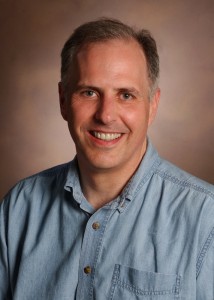 Renowned genetic scientist to lead collaboration to use lessons from big data to benefit individual patients, broader communities
Renowned genetic scientist to lead collaboration to use lessons from big data to benefit individual patients, broader communities
Case Western Reserve University, Cleveland Clinic and University Hospitals announced the launch of the Institute of Computational Biology, an innovative venture designed to enhance the institutions’ ability to draw actionable insights from the oceans of medical information each already possesses.
Renowned geneticist Jonathan L. Haines has been named institute director as well as chair of the Department of Epidemiology and Biostatistics and the Mary W. Sheldon, MD, Professor of Genomic Sciences at Case Western Reserve University School of Medicine.
“We feel extremely fortunate to welcome Dr. Haines into our academic and research ranks,” said Pamela B. Davis, dean of the School of Medicine and vice president of academic affairs. “He is an innovative researcher and a multitasking genius who fits right in with the spirit of collaboration we embrace here. His body of work is astonishing and his results groundbreaking. And we believe his vision will lead us to new heights in the biomedical community.”
Haines comes to Cleveland from Vanderbilt University, where he founded the Center for Human Genetics Research as well as a doctoral program in human genetics. The center grew to include nearly 20 principal investigators, and served dozens of faculty and students with data analysis, technological assistance and assessment of genes’ role in specific conditions.
The new institute will develop the technological infrastructure to allow scientists and physicians from the three institutions to examine existing clinical data for lessons to improve treatment of individual patients and enhance community health.
“We can collect myriad genetics/genomics data from every one of our patients, but if we don’t have the capability to convert that data into actionable information, we have gained nothing,” said Paul DiCorleto, chair of Cleveland Clinic’s Lerner Research Institute. “The Institute of Computational Biology will provide this capability with cutting-edge bioinformatics approaches.”
At Vanderbilt, Haines led teams that made major advances identifying the genes involved in Alzheimer’s disease, macular degeneration, multiple sclerosis and autism. Haines also helped build the biological repository linked to Vanderbilt’s medical records database. The strength of Cleveland’s medical institutions drew him to Northeast Ohio.
“There’s a tremendous amount of expertise and a strongly collaborative atmosphere here,” Haines said. “I look forward to working with all of our partners.”
“Jonathan is a brilliant epidemiologist who has been at the forefront of an incredible generation of scientific advancement and we are very pleased to have him join our organizations,” said Fred C. Rothstein, president of University Hospitals (UH) Case Medical Center. “His work has led to a better understanding of the connections between DNA and disease and he is a pioneer in the highly complex processes of using emerging data-mining tools to solve even-more-complex medical and public-health problems.”
Anthony Wynshaw-Boris, chair of the School of Medicine and UH Case Medical Center’s Department of Genetics and Genome Science, spoke glowingly of Haines as a scientist and leader.
“Dr. Haines will be a welcome addition to Cleveland’s biomedical community. He is collaborative, and I expect our departments to interact closely as we rebuild our departments and make our programs among the very best.”
Added Case Comprehensive Cancer Center Director Stan Gerson: “Dr. Haines’ work cuts across institutions, scientific programs and the basic-to-clinical-to population continuum. We need his expertise in building these comprehensive bioinformatics efforts for our genomics, clinical research and population prevention and risk assessment studies. For all our large projects, Dr. Haines will bring a big boost to our programs.”
Haines earned his doctorate in genetics from the University of Minnesota and received postdoctoral training at the Indiana University School of Medicine. He began his professional career as an instructor of Neurology at Harvard Medical School in 1987 and remained there as an associate professor until he left for Vanderbilt in 1997. Haines holds five patents for his work with Alzheimer’s disease, multiple sclerosis and macular degeneration.
